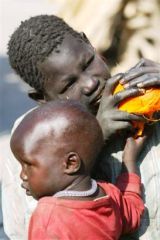Southern Sudan faces formidable challenges
By RODRIQUE NGOWI
JUBA, Sudan, Aug 12, 2005 (AP) — Twenty-one years of civil war have left southern Sudan with roads in disrepair, some of them mined. Electricity is scarce, as are clinics, schools, even police and judges.

|
|
Two boys share a mango fruit, Thursday, Jan. 20, 2005 in a camp for returnees in Rumbek in southern Sudan. (AP). |
But now a southerner has taken his place in the leadership of a unity government pledged to lead Sudan toward lasting peace. Hopes for change are high _ “even to the extent of expecting miracles to happen overnight,” Lt. Gen. James Wani Igga, secretary general of the former rebel Sudan People’s Liberation Movement, said in this capital for the south.
SPLM leader Salva Kiir Mayardit was sworn in as Sudan’s first vice president on Thursday, replacing the late John Garang.
Garang’s death in a July 30 helicopter crash left some worrying the fragile peace struck in January would not hold. Now it is up to Kiir, who also succeeded Garang as leader of the semiautonomous south, to overcome myriad challenges. Some were created by the ravages of war, some by Sudan’s history of divisive politics, some by Garang’s autocratic legacy.
The January peace agreement calling for wealth- and power-sharing between the Arab Muslim-dominated north and the African Christian and animist south will mean little unless Kiir can overcome abject poverty in the south.
Rebuilding means finding skilled workers in a region where a generation has had little access to primary education. The few classes that are held are often convened in the shade of trees and led by unqualified teachers. Only two percent of those who start school get as far as a high school diplomat, and only 24 percent of adults are literate, according to the New Sudan Center for Statistics and Evaluation, a southern institution.
The gross national income per capita in the south is estimated at less than US$90 (A73) a year, four times lower than the rest of Sudan. Some 90 percent of the 7.5 million people here earns less than a dollar (80 euro cents) a day.
To even begin to address the economic crisis, the former liberation movement has to become a civilian authority, a transformation with which rebel movements across Africa have struggled.
That southern Sudan has the remnants of a bureaucracy should help. But Kiir may find himself trying to balance the right to work of civil servants now in place against demands of former rebels who sacrificed limbs and risked their lives for the movement, and now may see a government job as a just reward.
Kiir trained in military intelligence in South Africa and Kenya and has a reputation as a disciplined military officer who pulled off legendary battlefield successes. But his abilities as a politician and administrator are largely untested.
Kiir will also have to be a diplomat, moving aggressively to end decades of animosity and mistrust between his majority Dinka and other smaller tribes and the Nuer, the second largest community. Tribal tensions were manipulated by northern politicians to weaken the south.
Kiir is scrambling to name Cabinet ministers in the national and southern governments. Garang died before telling colleagues his plans for appointments, Wani Igga said.
Kiir had pressed Garang to make leadership of the movement transparent and democratic. Garang’s penchant for making decisions himself had caused other southern leaders to break away.
Kiir needs to quickly negotiate a settlement with other southern armed groups _ including one controlling a region producing 90 percent of Sudan’s oil. By year’s end, all groups are to join the southern army or central government forces under an interim constitution drafted as part of the peace agreement.
Kiir must also address difficult issues negotiators failed to resolve in the January agreement, including a border dispute that must be settled before a secession referendum is held in six years.
Although the north-south borders are defined under the peace accords as those at the time of independence in 1956, Khartoum has several times attempted to alter them to place oil in the north, according to a July 25 report by the International Crisis Group.
The disagreements have the potential to delay disbursement of oil revenues indefinitely, which would undermine the south’s ability to implement the peace accords as well as heighten mutual distrust, according to the Brussels-based group that tracks conflicts around the world.
